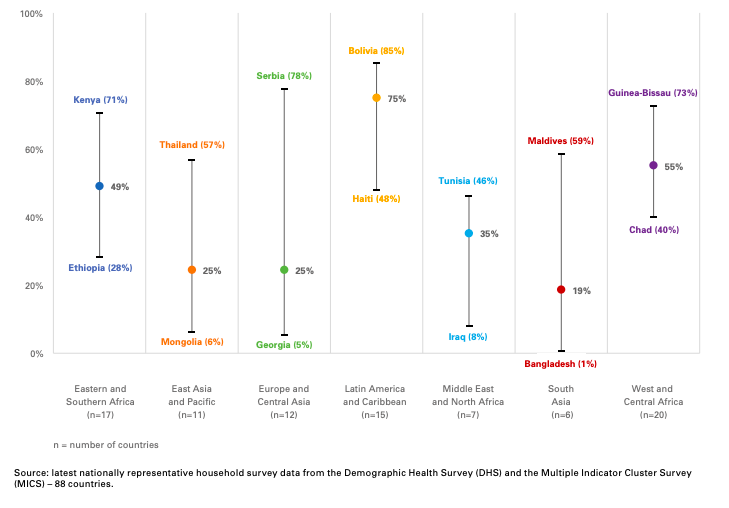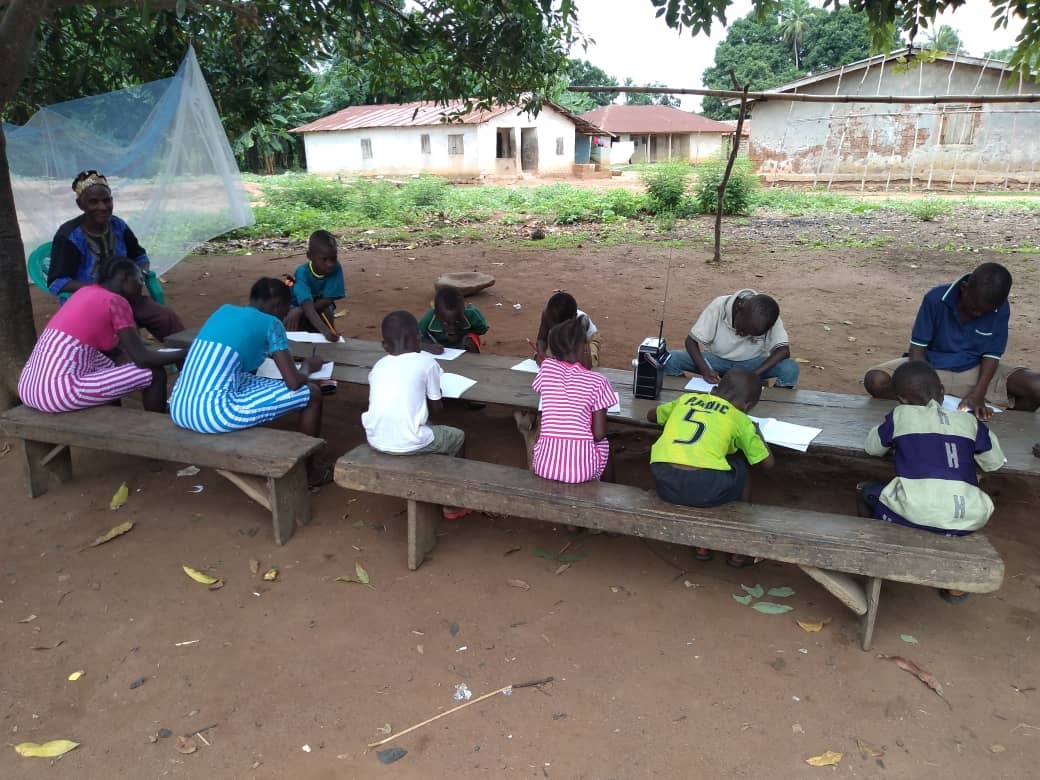Since joining the @GlobalEdTechHub, I have been exploring if and how radio can keep children learning during the current pandemic.  https://abs.twimg.com/emoji/v2/... draggable="false" alt="📚" title="Bücher" aria-label="Emoji: Bücher">
https://abs.twimg.com/emoji/v2/... draggable="false" alt="📚" title="Bücher" aria-label="Emoji: Bücher"> https://abs.twimg.com/emoji/v2/... draggable="false" alt="📻" title="Radio" aria-label="Emoji: Radio">
https://abs.twimg.com/emoji/v2/... draggable="false" alt="📻" title="Radio" aria-label="Emoji: Radio">
Here& #39;s a thread on what I& #39;ve learned so far.
Here& #39;s a thread on what I& #39;ve learned so far.
Radio broadcasts have been shown to improve student learning outcomes  https://abs.twimg.com/emoji/v2/... draggable="false" alt="🙌" title="Raising hands" aria-label="Emoji: Raising hands">
https://abs.twimg.com/emoji/v2/... draggable="false" alt="🙌" title="Raising hands" aria-label="Emoji: Raising hands"> https://abs.twimg.com/emoji/v2/... draggable="false" alt="🙌" title="Raising hands" aria-label="Emoji: Raising hands">
https://abs.twimg.com/emoji/v2/... draggable="false" alt="🙌" title="Raising hands" aria-label="Emoji: Raising hands"> https://abs.twimg.com/emoji/v2/... draggable="false" alt="🙌" title="Raising hands" aria-label="Emoji: Raising hands">
https://abs.twimg.com/emoji/v2/... draggable="false" alt="🙌" title="Raising hands" aria-label="Emoji: Raising hands">
In the past, radio lessons have helped children succeed in maths, literacy and social studies.
What to know more? Check out this paper: https://www.edc.org/sites/default/files/uploads/Tuned-Student-Success.pdf">https://www.edc.org/sites/def...
In the past, radio lessons have helped children succeed in maths, literacy and social studies.
What to know more? Check out this paper: https://www.edc.org/sites/default/files/uploads/Tuned-Student-Success.pdf">https://www.edc.org/sites/def...
Before we get too excited, most studies have focused on how radio lessons support learning *in the classroom*. Radio broadcasts can help teachers to structure live lessons and lead learning activities.  https://abs.twimg.com/emoji/v2/... draggable="false" alt="🧑🏫" title="Teacher" aria-label="Emoji: Teacher">
https://abs.twimg.com/emoji/v2/... draggable="false" alt="🧑🏫" title="Teacher" aria-label="Emoji: Teacher">
It& #39;s not totally clear if broadcasts can help children learn at home.
It& #39;s not totally clear if broadcasts can help children learn at home.
What do we know? Lessons need to be interactive.
A presenter should first introduce an idea and show learners how it works. Children can then test their skills in fun activities such as quizzes, singing and games. https://abs.twimg.com/emoji/v2/... draggable="false" alt="🎙️" title="Studiomikrofon" aria-label="Emoji: Studiomikrofon">
https://abs.twimg.com/emoji/v2/... draggable="false" alt="🎙️" title="Studiomikrofon" aria-label="Emoji: Studiomikrofon">
Check out @risingacademies for examples of interactive radio!
A presenter should first introduce an idea and show learners how it works. Children can then test their skills in fun activities such as quizzes, singing and games.
Check out @risingacademies for examples of interactive radio!
Radios are not a universally accessible form of technology. @UNICEFEducation published this great graph that shows how radio ownership varies across different countries.
Even in countries with high rates of radio ownership, few children may tune into lessons. Why?
Even in countries with high rates of radio ownership, few children may tune into lessons. Why?
If radio coverage is not extensive, many learners will miss out. Local radio stations can be a great way to widen access although negotiations and logistics can take time.
This reflection makes me sad that @minsterfm is shutting down. https://abs.twimg.com/emoji/v2/... draggable="false" alt="🙁" title="Leicht stirnrunzelndes Gesicht" aria-label="Emoji: Leicht stirnrunzelndes Gesicht">
https://abs.twimg.com/emoji/v2/... draggable="false" alt="🙁" title="Leicht stirnrunzelndes Gesicht" aria-label="Emoji: Leicht stirnrunzelndes Gesicht">
This reflection makes me sad that @minsterfm is shutting down.
Children may have to skip radio lessons if they need to support their families with work or if they cannot afford batteries  https://abs.twimg.com/emoji/v2/... draggable="false" alt="🔋" title="Batterie" aria-label="Emoji: Batterie">
https://abs.twimg.com/emoji/v2/... draggable="false" alt="🔋" title="Batterie" aria-label="Emoji: Batterie"> https://abs.twimg.com/emoji/v2/... draggable="false" alt="🔋" title="Batterie" aria-label="Emoji: Batterie">
https://abs.twimg.com/emoji/v2/... draggable="false" alt="🔋" title="Batterie" aria-label="Emoji: Batterie">
Even if learners can listen to broadcasts, they may not understand the language of instruction (especially in countries with many dialects).
Even if learners can listen to broadcasts, they may not understand the language of instruction (especially in countries with many dialects).
Evidence from the Ebola crisis also suggests that children struggled to benefit from radio lessons without the support of a trusted adult or study group.
@PlanUK consider some of the above challenges in this report: #download-options">https://plan-international.org/publications/ebola-beyond-health%C2%A0emergency #download-options">https://plan-international.org/publicati...
@PlanUK consider some of the above challenges in this report: #download-options">https://plan-international.org/publications/ebola-beyond-health%C2%A0emergency #download-options">https://plan-international.org/publicati...
Many organisations are trialling innovative ways to overcome these challenges.
@JosephMKai1 and @EducAidSL team shared this photo of a village chief supporting learners following an interactive radio lesson.
Interactive? https://abs.twimg.com/emoji/v2/... draggable="false" alt="✅" title="Fettes weißes Häkchen" aria-label="Emoji: Fettes weißes Häkchen"> Adult?
https://abs.twimg.com/emoji/v2/... draggable="false" alt="✅" title="Fettes weißes Häkchen" aria-label="Emoji: Fettes weißes Häkchen"> Adult?  https://abs.twimg.com/emoji/v2/... draggable="false" alt="✅" title="Fettes weißes Häkchen" aria-label="Emoji: Fettes weißes Häkchen"> Study group?
https://abs.twimg.com/emoji/v2/... draggable="false" alt="✅" title="Fettes weißes Häkchen" aria-label="Emoji: Fettes weißes Häkchen"> Study group?  https://abs.twimg.com/emoji/v2/... draggable="false" alt="✅" title="Fettes weißes Häkchen" aria-label="Emoji: Fettes weißes Häkchen"> Social distance?
https://abs.twimg.com/emoji/v2/... draggable="false" alt="✅" title="Fettes weißes Häkchen" aria-label="Emoji: Fettes weißes Häkchen"> Social distance?  https://abs.twimg.com/emoji/v2/... draggable="false" alt="✅" title="Fettes weißes Häkchen" aria-label="Emoji: Fettes weißes Häkchen">
https://abs.twimg.com/emoji/v2/... draggable="false" alt="✅" title="Fettes weißes Häkchen" aria-label="Emoji: Fettes weißes Häkchen">
@JosephMKai1 and @EducAidSL team shared this photo of a village chief supporting learners following an interactive radio lesson.
Interactive?
@IEIPakistan are starting to deliver audio recordings to students on low-cost MP3 players.  https://abs.twimg.com/emoji/v2/... draggable="false" alt="🎧" title="Kopfhörer" aria-label="Emoji: Kopfhörer">
https://abs.twimg.com/emoji/v2/... draggable="false" alt="🎧" title="Kopfhörer" aria-label="Emoji: Kopfhörer"> https://abs.twimg.com/emoji/v2/... draggable="false" alt="🎧" title="Kopfhörer" aria-label="Emoji: Kopfhörer">
https://abs.twimg.com/emoji/v2/... draggable="false" alt="🎧" title="Kopfhörer" aria-label="Emoji: Kopfhörer">
If learners have WhatsApp, schools could also send audio files to groups of students.
(Okay, this is technically interactive audio instruction but let& #39;s avoid the jargon).
If learners have WhatsApp, schools could also send audio files to groups of students.
(Okay, this is technically interactive audio instruction but let& #39;s avoid the jargon).
@MonroviaFA teamed up with @Orange_Liberia to launch an interactive voice response programme.
Students can use their phones & #39;speak& #39; to a computer voice that will ask questions and respond to answers. https://abs.twimg.com/emoji/v2/... draggable="false" alt="📱" title="Mobiltelefon" aria-label="Emoji: Mobiltelefon">
https://abs.twimg.com/emoji/v2/... draggable="false" alt="📱" title="Mobiltelefon" aria-label="Emoji: Mobiltelefon"> https://abs.twimg.com/emoji/v2/... draggable="false" alt="📞" title="Telefonhörer" aria-label="Emoji: Telefonhörer">
https://abs.twimg.com/emoji/v2/... draggable="false" alt="📞" title="Telefonhörer" aria-label="Emoji: Telefonhörer">
Many UK banks use a similar system to direct calls on their phone lines
Students can use their phones & #39;speak& #39; to a computer voice that will ask questions and respond to answers.
Many UK banks use a similar system to direct calls on their phone lines

 Read on Twitter
Read on Twitter
 Adult? https://abs.twimg.com/emoji/v2/... draggable="false" alt="✅" title="Fettes weißes Häkchen" aria-label="Emoji: Fettes weißes Häkchen"> Study group? https://abs.twimg.com/emoji/v2/... draggable="false" alt="✅" title="Fettes weißes Häkchen" aria-label="Emoji: Fettes weißes Häkchen"> Social distance? https://abs.twimg.com/emoji/v2/... draggable="false" alt="✅" title="Fettes weißes Häkchen" aria-label="Emoji: Fettes weißes Häkchen">" title="Many organisations are trialling innovative ways to overcome these challenges. @JosephMKai1 and @EducAidSL team shared this photo of a village chief supporting learners following an interactive radio lesson.Interactive? https://abs.twimg.com/emoji/v2/... draggable="false" alt="✅" title="Fettes weißes Häkchen" aria-label="Emoji: Fettes weißes Häkchen"> Adult? https://abs.twimg.com/emoji/v2/... draggable="false" alt="✅" title="Fettes weißes Häkchen" aria-label="Emoji: Fettes weißes Häkchen"> Study group? https://abs.twimg.com/emoji/v2/... draggable="false" alt="✅" title="Fettes weißes Häkchen" aria-label="Emoji: Fettes weißes Häkchen"> Social distance? https://abs.twimg.com/emoji/v2/... draggable="false" alt="✅" title="Fettes weißes Häkchen" aria-label="Emoji: Fettes weißes Häkchen">" class="img-responsive" style="max-width:100%;"/>
Adult? https://abs.twimg.com/emoji/v2/... draggable="false" alt="✅" title="Fettes weißes Häkchen" aria-label="Emoji: Fettes weißes Häkchen"> Study group? https://abs.twimg.com/emoji/v2/... draggable="false" alt="✅" title="Fettes weißes Häkchen" aria-label="Emoji: Fettes weißes Häkchen"> Social distance? https://abs.twimg.com/emoji/v2/... draggable="false" alt="✅" title="Fettes weißes Häkchen" aria-label="Emoji: Fettes weißes Häkchen">" title="Many organisations are trialling innovative ways to overcome these challenges. @JosephMKai1 and @EducAidSL team shared this photo of a village chief supporting learners following an interactive radio lesson.Interactive? https://abs.twimg.com/emoji/v2/... draggable="false" alt="✅" title="Fettes weißes Häkchen" aria-label="Emoji: Fettes weißes Häkchen"> Adult? https://abs.twimg.com/emoji/v2/... draggable="false" alt="✅" title="Fettes weißes Häkchen" aria-label="Emoji: Fettes weißes Häkchen"> Study group? https://abs.twimg.com/emoji/v2/... draggable="false" alt="✅" title="Fettes weißes Häkchen" aria-label="Emoji: Fettes weißes Häkchen"> Social distance? https://abs.twimg.com/emoji/v2/... draggable="false" alt="✅" title="Fettes weißes Häkchen" aria-label="Emoji: Fettes weißes Häkchen">" class="img-responsive" style="max-width:100%;"/>


